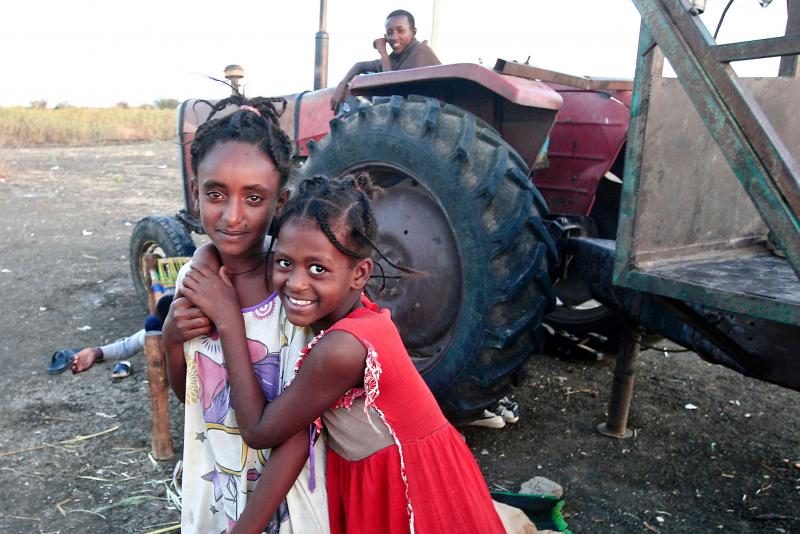Ethiopians who have escaped the intense fighting in their northern homeland of Tigray by fleeing into Sudan are safe, but the terrifying nightmare of what they witnessed continues to haunt them.
“I saw bodies dismembered by the explosions,” said Ganet Gazerdier, a 75-year-old sitting alone in the dust at eastern Sudan’s Um Raquba Refugee Camp, newly opened to cope with a sudden influx of more than 27,000 people fleeing airstrikes, artillery barrages and massacres in Ethiopia.
“Other bodies were rotting, lying on the road, murdered with a knife,” she added.

Photo: AFP
Distraught at having been forced to flee their homes, traumatized by becoming separated from family members in the mad rush and horrified after witnessing killings, refugees wander as if dazed in the camp.
“I lived with my three daughters,” said Gazerdier, dressed in a blue dress and white headscarf to protect her from the blazing sun. “When the shells started to rain down on our house, we all panicked and fled in the dark.”
The bombardment not only destroyed her house in Humera, the site of reportedly some of the heaviest fighting, but also separated her from her family.
Everyone scattered and she has yet to make contact with them.
She has found some help at the camp, 80km from the border, but conditions are rough, with only basic emergency relief set up.
For the Ethiopians who arrive, there is an initial sense of relief that they are safe.
However, for many, a sense of guilt soon kicks in, as they sit and wait in the hope that those they love might also turn up.
To escape, Messah Geidi split from his wife and four-year-old son — and he cannot forgive himself.
“I don’t know where they are, and if they are still alive,” he said.
Geidi comes from Mai-Kadra, where Amnesty International said last week that “scores, and likely hundreds, of people were stabbed or hacked to death.”
“I fled Mai-Kadra, because the army slaughtered the young people like sheep,” Geidi said.
The UN High Commissioner for Refugees (UNHCR) said that the border area faces an emergency.
“A full-scale humanitarian crisis is unfolding,” UNHCR spokesman Babar Baloch said, adding that about 4,000 people were fleeing across the frontier each day.

THE TRAGEDY OF PUNCH: Footage of the seven-month-old Japanese macaque has gone viral online after he was rejected by his mother and formed a bond with a soft toy A baby monkey in Japan has captured hearts around the world after videos of him being bullied by other monkeys and rejected by his mother went viral last week. Punch, a Japanese macaque, was born in July last year at Ichikawa City Zoo. He has drawn international attention after zookeepers gave him a stuffed orangutan toy after he was abandoned by his mother. Without maternal guidance to help him integrate, Punch has turned to the toy for comfort. He has been filmed multiple times being dragged and chased by older Japanese macaques inside the enclosure. Early clips showed him wandering alone with

Australian Prime Minister Anthony Albanese yesterday said he did not take his security for granted, after he was evacuated from his residence for several hours following a bomb threat sent to a Chinese dance group. Albanese was evacuated from his Canberra residence late on Tuesday following the threat, and returned a few hours later after nothing suspicious was found. The bomb scare was among several e-mails threatening Albanese sent to a representative of Shen Yun, a classical Chinese dance troupe banned in China that is due to perform in Australia this month, a spokesperson for the group said in a statement. The e-mail

South Korea would soon no longer be one of the few countries where Google Maps does not work properly, after its security-conscious government reversed a two-decade stance to approve the export of high-precision map data to overseas servers. The approval was made “on the condition that strict security requirements are met,” the South Korean Ministry of Land, Infrastructure and Transport said. Those conditions include blurring military and other sensitive security-related facilities, as well as restricting longitude and latitude coordinates for South Korean territory on products such as Google Maps and Google Earth, it said. The decision is expected to hurt Naver and Kakao

TENSIONS: The march went ahead without clashes, but arrests were still possible as police investigate suspects behind Nazi salutes, racist slurs and homophobic insults Thousands of people on Saturday marched in southeastern France under heavy security in tribute to a far-right activist whose killing, blamed on the hard left, has put the country on edge. The crowd — many wearing black and some covering their lower faces with masks — marched through the city of Lyon carrying flowers and placards bearing pictures of Quentin Deranque and the words: “justice for Quentin” and “the extreme left kills.” The 23-year-old died from head injuries following clashes between radical left and far-right supporters on the sidelines of a demonstration against a politician from the left-wing France Unbowed